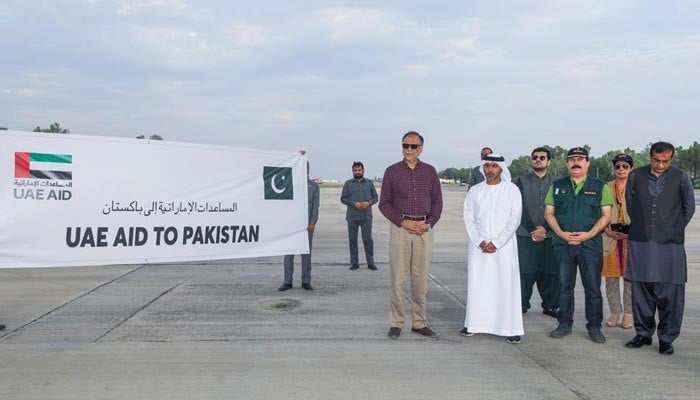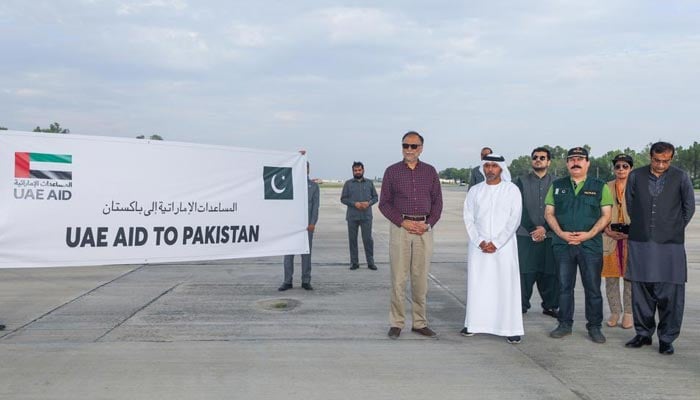Let's recognize humanitarians who work tirelessly, day and night, to save lives at risk
When the merchant vessel Razoni sailed from Ukraine's Black Sea port of Odesa earlier this month with more than 26,000 tons of corn for global markets, she was rightly the subject of intense attention.
Her passage was the result of months of negotiations between Russia, Türkiye, Ukraine and the United Nations, including UN humanitarian staff, logisticians and legal experts.
For the first time since the war in Ukraine began five months earlier, sea exports of Ukrainian crops were to resume, giving much-needed hope to millions of people beaten down by rising food prices and declining supplies, pushing many into hunger and even famine conditions.
And hope is so rare these days.
Conflicts. Hunger. The climate crisis. Droughts. Poverty. A pandemic. In more than 40 years of aid work, I don't remember the world being so overwhelmed with problems and in such urgent need of action to solve them.
Right now, a record 303 million people need humanitarian aid.
A glimmer of hope
But despite this grim picture, I still hold on to hope. Why? Because over the years, I have seen that while conflicts and other crises bring out the worst, they also inspire the very best in humanity.
Even in the depths of despair and division, there are glimmers of hope -- from new solutions to seemingly intractable problems, to acts of generosity and kindness that bring solace to the suffering.
Delivering hope and standing in solidarity are at the very heart of humanitarian action. Today, on World Humanitarian Day, we want to celebrate this spirit, for in some of the bleakest situations it may be all that people have.
There is a phrase "It takes a village to raise a child." Likewise, it takes a village to help a community in crisis.
This village is made up of affected communities themselves, who are always first to respond when crisis strikes, backed up by a support system of national emergency services, local businesses and civil society, non-governmental organizations (NGOs), UN agencies, and the Red Cross and Red Crescent family. Many are international aid workers, but the vast majority of humanitarians are from the crisis-affected countries themselves.
Every hour of every day, this humanitarian 'village' steps up to organize relief deliveries, distribute cash, set up mobile health clinics and schools, build water pumps, airlift nutrition supplies, provide counselling support and so much more, supporting millions of people balancing on the edge of survival.
This village is populated by aid workers like Zuhra Wardak, a champion of girls' education and gender issues, who was one of the first to return to work in Afghanistan following the Taliban's takeover.
And Andrii, a driver with Ukrainian NGO Proliska, who risks his life to evacuate people from areas under bombardment.
And Amina Haji Elmi, a women's rights champion in Somalia, who realized helping women was her mission after she and her family were displaced by conflict in that country.
There are also glimmers of hope at the wider level.
For instance, amid the relentless violence in Ukraine, we have seen thousands of volunteers assisting people trapped in war zones, and the generosity of communities that have welcomed Ukrainian refugees, echoing a long tradition of neighbourly support that is evident from Bangladesh to Colombia, from Jordan to Uganda.
We can draw inspiration from political progress made in brutal and bloody crises like Yemen, where the truce has held, dissipating some of the constant fear of violence.
From improved access to people in need in Ethiopia's Tigray Region, which, thanks to persistent and painstaking negotiations, has enabled aid convoys to reach people who desperately need food.
From the passing of Security Council resolution 2642 allowing cross-border aid to continue into north-west Syria, extending a lifeline for millions of people at least for the next few months.
And from the Navi Star, Polarnet, Razoni, Rojen and many other ships that carried Ukrainian crops to the rest of the world, offering a grain of hope to some of the 345 million people suffering from food shortages.

Sign up for free AllAfrica Newsletters
Get the latest in African news delivered straight to your inbox
Success!
Almost finished...
We need to confirm your email address.
To complete the process, please follow the instructions in the email we just sent you.
Error!
There was a problem processing your submission. Please try again later.
On World Humanitarian Day, let us take a moment to recognize all those who work tirelessly, day and night, to enact solidarity often at great personal sacrifice. They save lives in places that the world too often chooses to forget and where the risks are real: 461 aid workers were attacked last year while responding to humanitarian crises -- 141 of them were killed, all but a few of them national staff.
The courage and conviction of these aid workers, always pushing for ways to reach people even in the worst of the worst of crises, inspire us to never give up hope.
As we mark this year's World Humanitarian Day we commemorate those we have lost. And we celebrate all humanitarians who carry on this noble mission together.
After all, it takes a village...
Mr. Griffins is the Under-Secretary-General for Humanitarian Affairs and Emergency Relief Coordinator




